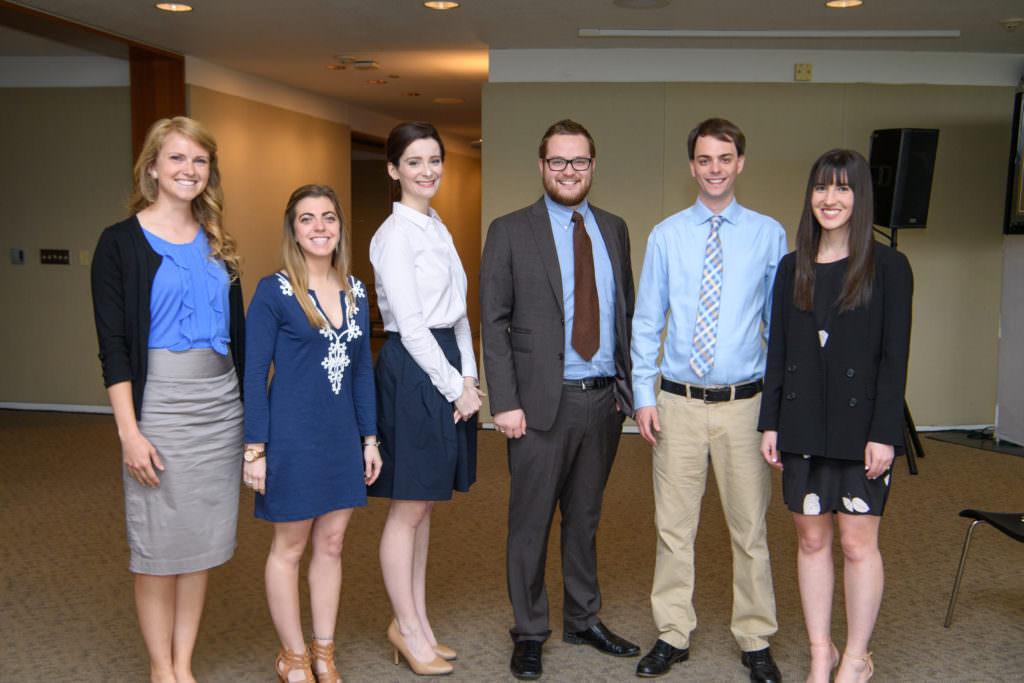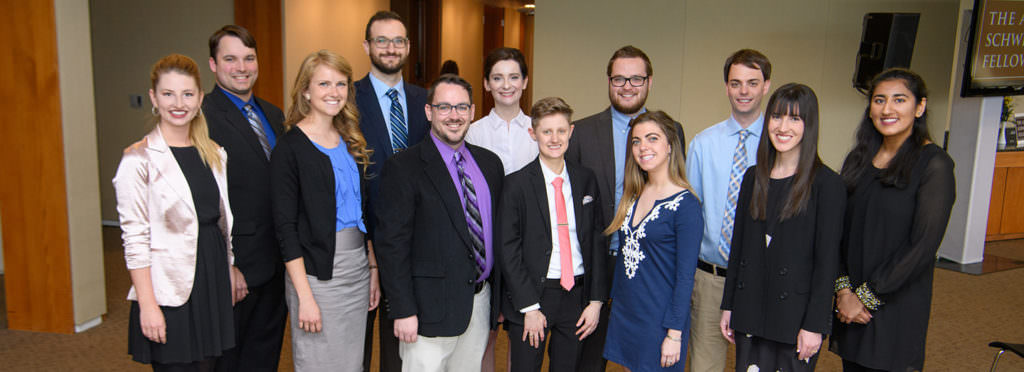
The Albert Schweitzer Fellowship recently announced the selection of its third cohort of Tulsa Schweitzer Fellows including six students from The University of Tulsa.
A total of twelve graduate and professional degree students from The University of Tulsa, Oklahoma State University and the University of Oklahoma will spend the next year learning to effectively address the factors that impact health and develop lifelong leadership skills. In doing so, they will follow the example set by famed physician-humanitarian Albert Schweitzer, for whom their Fellowship is named.
The second class completes the program later this month. Fellows from the first two years contributed more than 4,500 hours to projects they designed to address health gaps in Tulsa. In addition, Fellows report increased connection to Tulsa and a deep desire to continue their leadership to address the community’s health needs. Most of the projects have sustainability plans in place.
Schweitzer Fellows work to improve health outcomes through projects with community-based organizations.
“The Schweitzer Fellowship not only improves health outcomes from Tulsans, but it also trains leaders with lifelong leadership skills and deepens their connection to Tulsa. This means the Fellowship’s impact increases exponentially over time as each graduating group of Fellows goes on to lead community health efforts throughout their careers,” said Rachel Gold, director of the Tulsa chapter of The Albert Schweitzer Fellowship.
Schweitzer Fellows develop and implement service projects that address the root causes of health disparities in under-resourced communities while fulfilling their academic responsibilities. Each project is implemented in collaboration with a community-based organization. The Tulsa Schweitzer Fellows will address an array of health issues affecting a range of populations, with an increased focus this year on projects related to mental health. Fellows come from many academic disciplines including medicine, physical therapy, law, psychology, speech-language pathology and human development.
The Schweitzer Fellowship has an intensive leadership component, so that fellows can go on to inspire others to improve the health of those who experience barriers to care. Fellows work under the close guidance of community and academic mentors during their fellowship year.
Graduates of this year’s class will become Schweitzer Fellows for Life.
The new Tulsa fellows will join over 250 other 2018-19 Schweitzer Fellows working at program sites around the United States, as well as one in Lambaréné, Gabon, at the site of The Albert Schweitzer Hospital, founded by Dr. Schweitzer in 1913. The current Tulsa class will join the Schweitzer Fellows for Life network, comprising of more than 3,400 Schweitzer alumni who are skilled in, and committed to, addressing the health needs of underserved people throughout their careers.
Some of ASF’s Fellows for Life include Rishi Manchanda, MD, author of the TED book The Upstream Doctors: Medical Innovators Track Sickness To Its Source; Jessica Lahey, JD, author of the bestseller The Gift of Failure: How the Best Parents Learn To Let Go So Their Children Can Succeed; and Robert Satcher, Jr., MD, PhD, assistant professor, Anderson Cancer Center and NASA mission specialist. Additionally, three Schweitzer Fellows for Life were among those who deployed to West Africa to fight the Ebola outbreak in 2014: Meredith Dixon, MD, who is a CDC epidemic intelligence service officer; Nahid Bhadelia, MD, director of infection control at Boston’s National Emerging Infectious Diseases Laboratory and a hospital epidemiologist at Boston Medical Center; and William Fischer II, MD, a pulmonologist and critical care physician at University of North Carolina Health Care and UNC School of Medicine.
The Tulsa Schweitzer program is based at The University of Tulsa and works collaboratively with other area institutions of higher education. The Tulsa chapter is one of 14 U.S.-based sites. The others are in Alabama; Boston; Chicago; Columbus-Athens, Ohio; Dallas-Fort Worth; Detroit; Houston; Los Angeles; New Orleans; New Hampshire/Vermont; North Carolina; Pittsburgh; and San Francisco. Additionally, ASF has a program chapter based in Lambaréné, Gabon, at The Albert Schweitzer Hospital.
Tulsa Schweitzer Fellows 2018-19

The University of Tulsa
Erin Anderson, Speech-Language Pathology
Anderson’s project addresses the emotional needs of siblings of children with special needs.
Community Site: The Little Lighthouse
Alec Bracken, College of Law
Bracken’s project teaches children of undocumented immigrants and those effected by immigration issues how to be advocates for their parents and how to realize their own voices on immigration issues.
Community Site: Will Rogers High School in partnership with Communities in Schools
Alex Button, Doctor of Nursing Practice
Button’s project focuses on connecting people who have low health literacy with educational tools in order to improve the rate at which they take their medications.
Community Site: Tulsa Day Center for the Homeless
Katie Nelson, Speech-Language Pathology
Nelson’s project provides foundational literacy skills for children and families to promote increased literacy activities in the home.
Community Site: Kendall-Whittier Elementary School in partnership with Communities in Schools
Mollie Rischard Kimrey, Clinical Psychology
Kimrey’s project is a trauma-focused group psychotherapy program with children to address their symptoms of post-traumatic stress and promote resiliency.
Community Site: Positive Changes
Sarah Young, College of Law
Young’s Schweitzer project aims to improve retention of quality foster parents in the Tulsa community. She will do this through foster parent education and support in order to help foster parents feel more competent and confident in their ability to provide a stable environment for their foster children.
Community Site: Tulsa Advocates for the Protection of Children
Oklahoma State University
Brendon Glon, Counseling Psychology and Jess White, Counseling Psychology
Glon and White’s Schweitzer project will establish a mental health referral and help line for LGBTQ+ Oklahomans. The project’s aim is to not only increase access to mental health resources for this population but also provide specialized, culturally competent training in LGBTQ+ issues for master’s level interns.
Community Site: Dennis R. Neill Equality Center
Patrick Grayshaw, Human Development and Family Science
Grayshaw’s project aims to engage a diverse group of residents to address their common health needs, in a way that facilitates action planning and asset-based community engagement.
Community Site: North Tulsa Community Coalition
University of Oklahoma-Tulsa
Iman Chaudhry, OU-TU School of Community Medicine and Ashley Sells, College of Allied Health
Chaudhry and Sells’ project provides fitness and nutrition classes for Muslim women in the Tulsa area, so they become empowered to take a more active role in their health.
Community Site: YWCA
Ashten Duncan, OU-TU School of Community Medicine
Duncan’s project aims to leverage hope in Tulsa’s chronically and transiently homeless in order to promote more successful transitions to stable housing situations.
Community Site: Mental Health Association of Oklahoma
See the Tulsa World article with student interviews here.
The Albert Schweitzer Fellowship (ASF) is preparing the next generation of professionals who will serve and empower vulnerable people to live healthier lives and create healthier communities. To date, more than 3,400 Schweitzer Fellows have delivered nearly 500,000 hours of service to nearly 300,000 people in need. Additionally, more than 100 Fellows have provided care at the 105-year-old Schweitzer Hospital in Lambaréné, Africa. Through this work and through the contributions of fellows whose professional careers serve their communities, ASF perpetuates the legacy and philosophy of physician-humanitarian Dr. Albert Schweitzer. ASF has 14 program locations in the U.S. and one in Lambaréné, Africa. Its national office is located in Boston, Massachusetts and hosted by Beth Israel Deaconess Medical Center.






